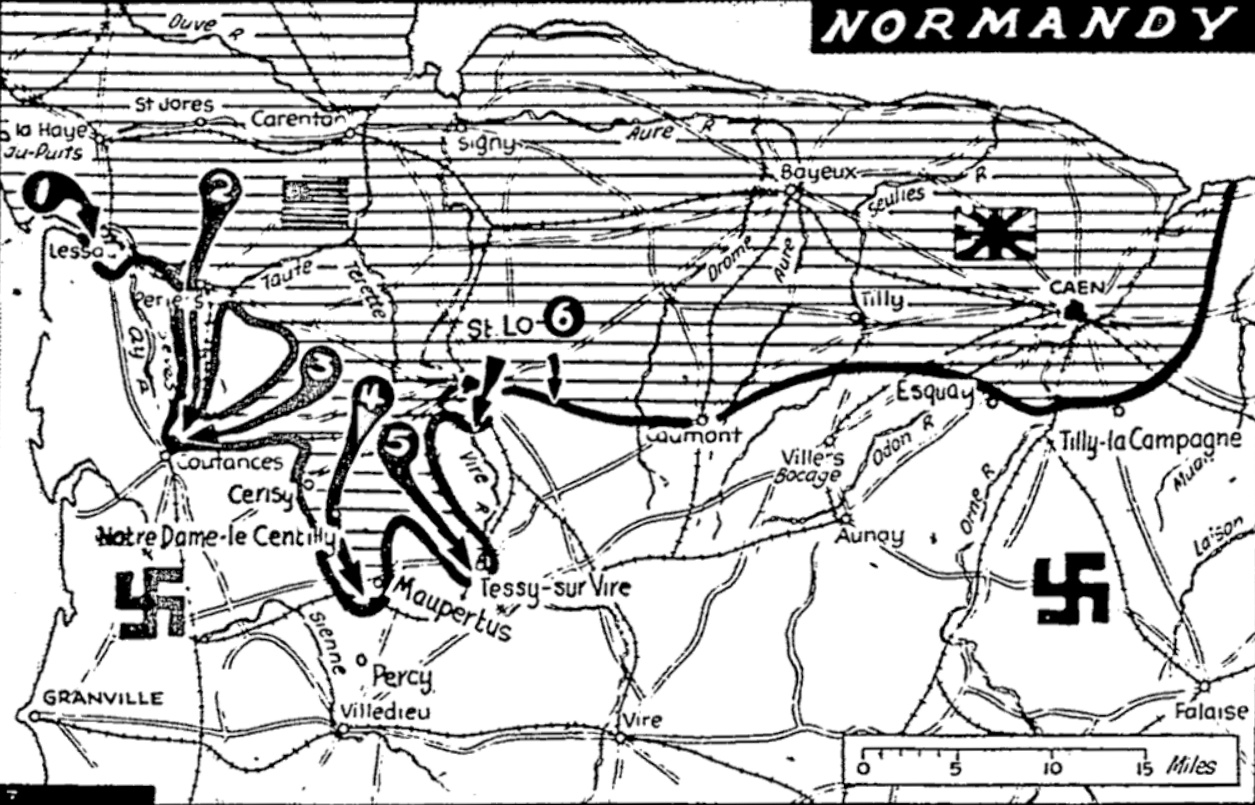Lt. Gen. McNair, 61, killed at front line in Normandy
Led training of ground forces
Washington (UP) –
Lt. Gen. Lesley J. McNair, the man who directed training of this country’s mammoth new ground forces for the battles they are now fighting around the world, was killed in the front line of the current U.S. offensive in Normandy, the War Department announced today. He was 61.
Before he fell, Gen. McNair saw the start of an offensive which has already smashed through the German lines and carried deeper into the enemy’s territory the doughboys whose training he directed.
Gen. McNair stood high in the small group of military leaders who, under Gen. George C. Marshall, Chief of Staff, built the U.S. Army from 1½ million men to its present size of 7,700,000.
Had narrow escape
Gen. McNair had some narrow escapes in other wars and had come close to death once before in this one. On April 23, 1943, while visiting the Tunisian front, a splinter from a German four-inch shell pierced his steel helmet and lodged a quarter of an inch from his brain.
He survived that experience, however, and shrugged it off with a tribute to the quality of steel in his helmet.
From March 1942 until recently, Gen. McNair was commanding general of the Army Ground Forces, a post which ranked him with Gen. H. H. Arnold, commander of the Army Air Forces, and Lt. Gen. Brehon B. Somervell, commander of the Army Supply Forces.
On July 14, the War Department announced that he had been succeeded by Lt. Gen. Ben Lear and had been given an “important overseas assignment.” What that assignment was has not yet been disclosed. It appeared possible that it might have been the command of an Army corps.
Second of rank killed
The War Department announcement said merely that Gen. McNair “was killed by enemy fire while observing the action of our frontline units in the recent offensive.”
Gen. McNair was the second officer of his rank to meet death in this war. The first was Lt. Gen. Frank M. Andrews, commander of U.S. forces in the European Theater, who was killed in a plane crash in Iceland on May 3, 1943.
Gen. McNair was credited with possessing one of the best brains in the Army. He used to be known as “the GHQ Sparkplug” and there are many stories around the Pentagon concerning the effect of his visits to Army units. One engineering unit which had taken pride in its ability to build a pontoon bridge in something over an hour pared by the time to 39 minutes shortly after a visit by Gen. McNair.
Gen. Marshall, on hearing of his death, described Gen. McNair as “an inspiring example to the forces of our great ground army which he organized and trained.”
The notable success of U.S. combat troops going into action for the first time against battle-hardened enemy troops was accredited in considerable degree to the effectiveness of this training program.
Gen. McNair was born in Verndale, Minnesota, May 25, 1883.
Gen. McNair was the sixth Army general officer to be killed in action in this war, not counting seven who died in airplane crashes and two who died from illnesses resulting from combat experience.
Others killed
Generals killed in action to date include:
-
Maj. Gen. Clarence L. Tinker: Missing in action off Midway June 7, 1942, and listed as presumed dead a year later.
-
Brig. Gen. Asa N. Duncan: Missing off the European coast Nov. 17, 1942, and declared dead a year later.
-
Brig. Gen. Nathan B. Forrest: Missing after a raid on Kiel, Germany, June 13, 1943, and now considered dead.
-
Brig. Gen. Donald F. Pratt: Killed in action June 6, 1944, in France.
-
Brig. Gen. Nelson M. Walker: Died of wounds July 10 in France.
Gen. McNair graduated from West Point in 1904. He went through the last war in France without a scratch but he had some close calls.
Gen. McNair served with the 1st Infantry Division of the AEF in France during the last war and also at general headquarters of the AEF. He won the Distinguished Service Medal for his work in gunnery.
In 1940, he was assigned as Chief of Staff of General Headquarters, Washington. When the War Department General Staff was reorganized in March 1942, he was made head of the Army Ground Forces.
Gen. McNair is survived by his widow, who lives at the Army War College here where Gen. McNair had his headquarters as head of the Ground Forces.
